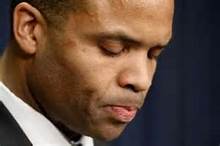 When Jesse Jackson Jr. recently agreed to plead guilty to federal charges to use $750,000 in campaign funds for lavish personal expenses Jackson said in an apologetic written statement that he offered no excuses for his conduct and accepted full responsibility for his improper decisions, mistakes, and errors in judgment. He went on to say, “…and while my journey is not yet complete, it is my hope that I am remembered for things I did right.”
When Jesse Jackson Jr. recently agreed to plead guilty to federal charges to use $750,000 in campaign funds for lavish personal expenses Jackson said in an apologetic written statement that he offered no excuses for his conduct and accepted full responsibility for his improper decisions, mistakes, and errors in judgment. He went on to say, “…and while my journey is not yet complete, it is my hope that I am remembered for things I did right.”
I doubt that will happen. In today’s society we’d rather remember people for the things they do wrong, not what they do right. I’m not saying people should not be held accountable for improper decisions, mistakes, or errors in judgment. I actually believe if you break a window, you should pay for it. However, when we think of others do we tend to think of their negative qualities or positive? What does God remember when he looks at us?
One of my goals for the New Year has been to reread the Bible from Genesis to Revelation – to review what I think I know and get a new overview on things I’ve missed. To be honest, I’ve found it a little discouraging. I had forgotten the flaws of our biblical patriarchs.
Abraham couldn’t get along with his cousin Lot, had more than one wife, and was so afraid he would be killed in a new land he lied about Sarah being his wife. In fact, he even gave Sarah to another man in Egypt to become his wife.
Isaac had concubines (Genesis 35:22) and definitely favored his son Esau over his son Jacob.
That favoritism didn’t do Esau much good because Jacob finagled him out of his first born birthright. As if that wasn’t bad enough, he actually pretended to be Esau so his father Isaac pronounced the blessings of the firstborn on him instead of Esau. Jacob also had multiple wives and concubines which seemed to be the accepted practice of the day.
Of course I’m only in Genesis. I’ll have more disappointing accounts ahead. Moses strikes the rock in anger and doesn’t get to go into the Promised Land; Jephthah makes a foolish vow and loses his daughter: Samson succumbs to Delilah and loses his strength: David has an affair with Bathsheba, has her husband Uriah killed so he can marry her and loses a son. The list is endless.
Notice that God doesn’t usually shield these men from the consequences of their actions. However, it is interesting to note that they are all mentioned fondly in the faith chapter (Hebrews 11). Although God had the events of these particular people recorded so we can learn from them, I don’t think he wants them remembered for what they did wrong, but rather for what they did right. They believed God, trusted God, and had faith in God. That’s why they are in the “Hall of Faith” chapter.
You see, God didn’t use these patriarchs because of their strengths, but rather in spite of their weaknesses. God works with us the same way. He knows us inside and out (Psalm 139:1-6) and loves us anyway (Romans 5:8). And through his forgiveness, God remembers our sins no more (Isaiah 43:12, Psalm 103:12). He looks on our hearts (I Samuel 16:7). If our hearts are right with God, we may still stumble, fall, and have to face consequences. However, I can’t help but believe that God now remembers us for the things we did right, not the things we did wrong.

